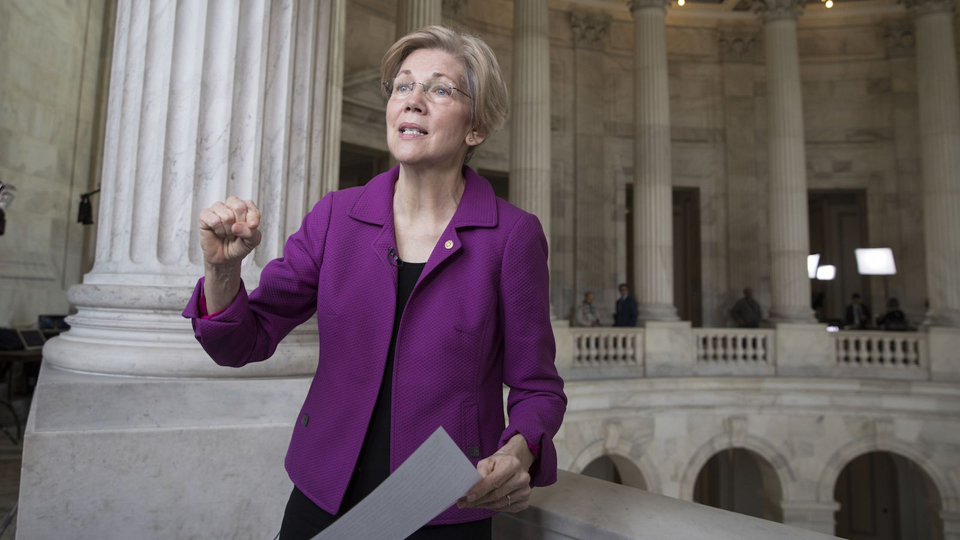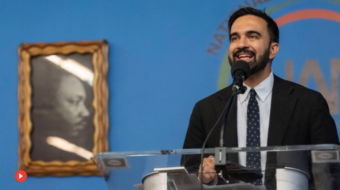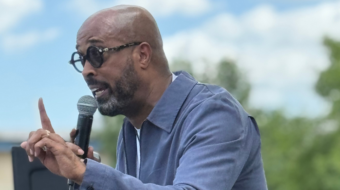
WASHINGTON—Aided by more than a dozen Democrats, many of them facing re-election races in red states, the Republican-run Senate is on the verge of passing a big bank-backed bill to loosen many restrictions put on financial institutions after those firms caused the Great Recession a decade ago.
A 67-32 vote on March 6 cleared the way for several days of debate on the measure, the Senate version of HR2155. The measure’s only virtue, some analysts said, is that it’s less of a giveaway to the financial behemoths than the complete deregulation bill the Republican-run House approved last year.
Seventeen Senate Democrats, including Joe Manchin (W. Va.), Claire McCaskill (Mo.), Heidi Heitkamp (N.D.), Joe Donnelly (Ind.) and Debbie Stabenow (Mich.), joined 49 Republicans and Sen. Angus King, Ind-Me., in that key vote. All face the voters this fall. All but King are running in states GOP presidential nominee Donald Trump carried two years ago.
Banks and other financial institutions lobbied heavily for the legislation, which would weaken – but not totally wreck – the 2010 Dodd-Frank law, passed after the crash. Unions, led by the Communications Workers, and pro-consumer groups strongly opposed it.
“After reckless Wall Street speculators and the big banks crashed our economy in 2008, Congress passed sensible rules to help make sure it couldn’t happen again,” CWA Communications Director Beth Allen wrote in an alert telling unionists to call, e-mail or wire their senators against the measure.
“Ever since, the lobbyists for the big banks have been waiting for a moment when they could weaken the rules and start putting other people’s money at risk again. And why not? After all, the big banks didn’t pay a price for causing the crisis — taxpayers bailed them out. The ones who suffered were working people who lost their homes, their retirement savings and their jobs.”
The measure would be “putting us all at risk for another financial meltdown. The bill would even reward banks that send jobs overseas,” she said. She then listed
The measure would cut the number of “too big to fail” banks that must undergo annual risk assessments – to make sure they have enough solid assets to withstand another crash – from 38 to 12. Now, Dodd-Frank requires banks with more than $50 billion in deposits to have enough assets to withstand a collapse. The Senate bill increases the minimum to $250 billion.
Dodd-Frank also barred all banks from mixing customers’ money with their own in risky speculation. That’s the “Volcker Rule,” which Wall Street has tried to kill ever since Congress passed the law eight years ago. HR2155 eliminates any bank with less than $10 billion in assets from the Volcker rule.
Allen noted HR2155 also “weakens fair lending protections” and exposes home buyers to “more financial exploitation.” Risky mortgages banks handled out, bundled into flimsy pieces of paper – financial instruments – and sold to big banks, led to the 2008 crash. When exploited homeowners defaulted, their loans became worthless, and so did those pieces of paper, thus busting the banks.
And federal laws ban housing discrimination by race, especially “redlining” majority-black neighborhoods. Allen said HR2155 weakens that ban. A recent series on public broadcasting showed widespread and continuing redlining nationwide.
None of the GOPers mentioned the behemoths. Banks and their lobby, the American Bankers Association, spent $66.6 million in lobbying lawmakers last year alone, Open Secrets reports. And they contributed $28 billion to congressional candidates in 2013-14, 72 percent of that to Congress’ ruling Republicans. They did not have the figures for 2015-16.
CWA’s Allen brought up the behemoth banks, though. “We can’t afford more giveaways to the rich and big banks at the expense of working people,” she said.
Instead, the Senate’s ruling Republicans “wrapped themselves in the flag,” so to speak, of aiding small businesses and community banks. They also claimed the deregulation would help consumers.
“This bill has received widespread support from commentators, regulators, businesses, and institutions representing millions of hard-working Americans and consumers, including over 10,000 community bankers, more than 100 million credit union consumer members, and thousands of small business owners and entrepreneurs, among others,” said Banking Committee Chairman Michael Crapo, R-Idaho.
Sen. Sherrod Brown, D-Ohio, the panel’s top Democrat, disagreed. And committee member Elizabeth Warren, D-Mass., a noted consumer advocate and foe of the big banks, launched the first of what she said would be seven long speeches – a mini-filibuster – to try to stop the legislation.
“The bill gives regulators way too much flexibility,” Brown said. The GOP didn’t want to do so “until they got regulators like” Trump Treasury Secretary Steve Mnuchin and Office of Management and Budget Director Mick “Mulvaney, and people like that who are much more likely to side with Wall Street. The White House is increasingly looking like a retreat for Wall Street executives, and these are the people who are going to be doing the regulation under this bill.”
Warren reminded her colleagues the crash hit and hurt real people – nine million people lost jobs, three million families were thrown out of their homes by foreclosures and one of every four dollars in pension assets vanished. She didn’t have to look far for an example: Her mother, in a prior crash.
“I lived in Oklahoma City, and my folks had picked out our house because it was right inside the boundary line of what my mother believed was the best school district in the county. Our lives seemed to be on track, right up until my daddy had a heart attack, and it all started sliding sideways. He was out of work for a long time.”
“My mother usually picked me up from school in our bronze two-toned station wagon. One day she showed up driving the old, off-white Studebaker Daddy had been driving back and forth to work. As I climbed in the car, I asked were the station wagon was.”
“It’s gone.” “Gone where?” “Gone.”
“I kept pushing. My mother was staring straight ahead, fingers tight on the steering wheel. After one more ‘Where?’ she answered in a low voice, ‘We couldn’t pay. They took it.’ And the house was next in line.”
That “is a feeling no family in this country should have. Especially not because Congress decided it was OK to let big banks gamble with the economy again. Yet here we are — on the verge of making the same mistake Congress has made so many times before.”
“The banks don’t want you to know what’s in this bill. Because if you did, they know you’d fight back. It was written by senators in back rooms and jammed through the Banking Committee, where its authors voted down every single amendment, every single idea, to make the bill even one smidge better or protect consumers just one tiny bit more. Republicans and Democrats had locked arms to do the bidding of the big banks.”
Consumer groups weighed in against the bill, too. “Congress ought to spend its time addressing the student loan crisis, cracking down on serial lawbreakers like Wells Fargo, and ensuring companies like Equifax pay a meaningful price for massive data breeches — not deregulating the financial services industry,” said Lisa Donner, executive director of labor-backed Americans for Financial Reform.
“Too many senators seem willing to ignore the lessons of the financial crisis, and what happens when we let big banks write the rules of the economy. Millions of Americans know the costs all too well and will take notice of how members vote on passage of this harmful legislation.”
The AFL-CIO issued no formal statement opposing the Senate version of the banking bill, but its financial institutions resolution, passed at last October’s convention, called for restoration of the Great Depression-era Glass-Steagall Act, which strictly split consumer banking – aiding Mom-and-Pop groceries and insuring your bank accounts – from securities trading and other such finagling.










